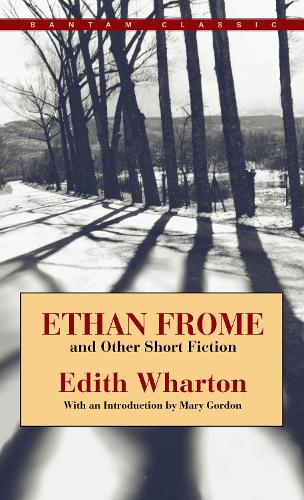
Ethan Frome and Other Short Fiction
(Paperback)
Publishing Details
Ethan Frome and Other Short Fiction
By (Author) Edith Wharton
Bantam Doubleday Dell Publishing Group Inc
Bantam Doubleday Dell Publishing Group
15th December 2007
United States
Classifications
General
Non Fiction
FIC
Physical Properties
Paperback
336
Width 106mm, Height 173mm, Spine 19mm
193g
Description
On a bleak New England farm, a taciturn young man has resigned himself to a life of grim endurance. Bound by circumstance to a woman he cannot love, Ethan Frome is haunted by a past of lost possibilities until his wife's orphaned cousin, Mattie Silver, arrives and he is tempted to make one final, desperate effort to escape his fate. In language that is spare, passionate, and enduring, Edith Wharton tells this unforgettable story of two tragic lovers overwhelmed by the unrelenting forces of conscience and necessity. Included with Ethan Frome are the novella The Touchstone and three short stories, 'The Last Asset,' 'The Other Two,' and 'Xingu.' Together, this collection offers a survey of the extraordinary range and power of one of America's finest writers.
Author Bio
The upper stratum of New York society into which Edith Wharton was born in 1862 provided her with an abundance of material as a novelist but did not encourage her growth as an artist. Educated by tutors and governesses, she was raised for only one career- marriage. But her marriage, in 1885, to Edward Wharton was an emotional disappointment, if not a disaster. She suffered the first of a series of nervous breakdowns in 1894. In spite of the strain of her marriage, or perhaps because of it, she began to write fiction and published her first story in 1889. Her first published book was a guide to interior decorating, but this was followed by several novels and story collections. They were written while the Whartons lived in Newport and New York, traveled in Europe, and built their grand home, The Mount, in Lenox, Massachusetts. In Europe, she met Henry James, who became her good friend, traveling companion, and the sternest but most careful critic of her fiction. The House of Mirth (1905) was both a resounding critical success and a bestseller, as was Ethan Frome (1911). In 1913 the Whartons were divorced, and Edith took up permanent residence in France. Her subject, however, remained America, especially the moneyed New York of her youth. Her great satiric novel, The Custom of the Country was published in 1913 and The Age of Innocence won her the Pulitzer Prize in 1921. In her later years, she enjoyed the admiration of a new generation of writers, including Sinclair Lewis and F. Scott Fitzgerald. In all, she wrote some thirty books, including an autobiography. A Backwards Glance (1934). She died at her villa near Paris in 1937.
